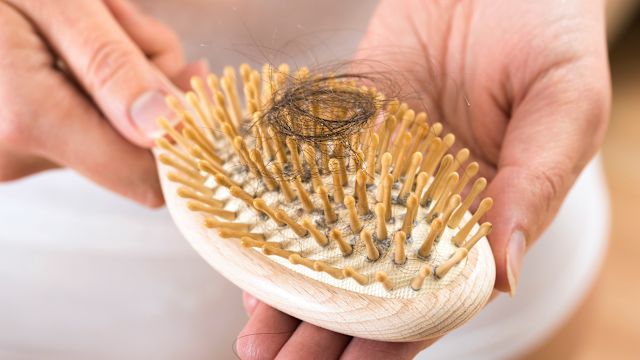Some shedding is perfectly normal. In fact, most people lose around 50 to 100 hairs every day. But nobody wants to lose more hair than that, and seeing all those strands on the bathroom floor can be alarming. What's going on? Here are six reasons why you may be losing your hair—a condition known as alopecia—and what you can do about it.
You inherited it
f thinning hair runs in your family, you're not alone: Hereditary hair loss, including male and female pattern baldness, is the most common cause of hair loss, affecting about 80 million people in the United States.
What to do: See a dermatologist early on if you notice any gradual thinning, a receding hairline or bald patches. They can differentiate between hereditary hair loss and other causes, and help you find the treatment plan, such as an oral or topical medication, that’s right for you.
You’re stressed out
Going through a highly stressful time, such as losing a loved one, moving to a new place or being in an accident, can cause a whopping one-half to three-quarters of scalp hair to shed. Your hair may come out in handfuls, and shedding may not even begin until weeks or months after the event. Most shedding due to stress is only temporary, and your hair should regain its fullness within about six to eight months.
What to do: Take care of yourself with calming activities like yoga, daily walks, deep breathing or meditation. If nothing seems to help and the stress—and the shedding—continue, see a healthcare provider (HCP).
You’re not eating enough protein
When your body doesn’t get enough protein, it tries to hold onto the little it does get—which in turn can slow the growth of new hair. And because of your hair’s natural growing and shedding cycle, you may not notice hair loss until two or three months later, making it harder to pinpoint the problem.
What to do: Incorporate foods rich in protein, such as chicken, milk, eggs, fish, nuts, seeds and beans, into your daily meals. How much is enough? Shoot for two to three servings per day, which equals a 3-ounce piece of meat, 1/2 cup of cooked beans, and an egg.
You're over-styling
A hard-on-your-hair daily washing and styling routine can cause or contribute to hair loss. If you think about it, it makes sense that constantly tugging, heating, and roughing up those delicate strands can do some major damage over time.
What to do: Practice gentle hair-care habits. When washing your hair, lightly massage shampoo into your scalp, and don’t skip the conditioner. Also, allow your hair to air dry or wrap it in a towel instead of rubbing it, and try to limit hot tools like flat irons and—if at all possible—blow dryers to once per week. As for styling, skip the ponytails, too-tight braids and buns, and go for looks that don’t pull on your hair.
Your hormones are fluctuating
Major hormonal changes such as giving birth or starting menopause can cause thinning hair, mainly due to falling estrogen levels. Taking birth control pills—and especially when you stop them—can be to blame, too.
What to do: Many problems with thinning hair due to hormonal changes tend to even out within six months to two years, so you may have to wait it out. If it bothers you, consider changing your hairstyle or experimenting with clip-on extensions or wigs. (Don't wear weaves or extensions for more than two to three months, which can lead to more hair loss.) If birth control pills seem to be the issue, talk with your HCP about other options.
Your thyroid is not functioning normally
Uniformly sparse hair—whether on your scalp, or even in your eyebrows—is one of the signs that thyroid hormones may have been out of balance for a while. Hair loss doesn’t discriminate between hypothyroidism (underactive thyroid that leads to a slower metabolism) and hyperthyroidism (overactive thyroid that leads to a faster metabolism), and can happen if you have either condition.
What to do: Visit an HCP as soon as you can. If a thyroid disorder is to blame, your HCP will prescribe thyroid hormone medication. In most cases, hair regrowth begins once the thyroid disorder is treated, although your hair may not grow back as fully as before.






